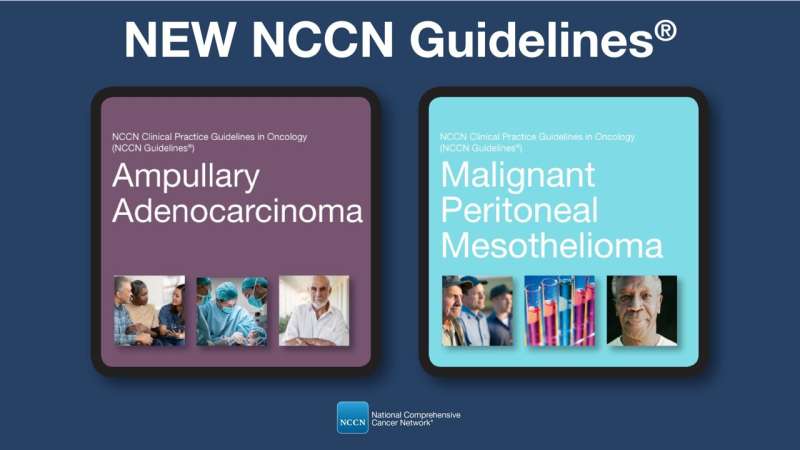National Comprehensive Cancer Network expands resources for treating rare cancer types

The National Comprehensive Cancer Network (NCCN)—an alliance of leading cancer centers—today announced the publication of new NCCN Clinical Practice Guidelines in Oncology (NCCN Guidelines) for Ampullary Adenocarcinoma. This evidence- and expert consensus-based resource follows the recent publication of new NCCN Guidelines for Malignant Peritoneal Mesothelioma, bringing the total number of clinical guidelines to 83.
"We know there's a real need to share evidence-based expert recommendations for some of these rarer tumor types, which oncologists see infrequently and may not have the opportunity to keep as up to date with," said NCCN Chief Medical Officer Wui-Jin Koh, MD. "NCCN Guidelines were downloaded more than 13 million times overall in 2021. Guidelines for the most common cancers, including breast, lung, colon, and prostate tend to be referenced the most, but we do hear from clinicians who would like more guidance to help patients with less common cancers achieve the best possible outcomes."
NCCN Guidelines are the recognized standard for clinical recommendations and policy in cancer management and the most thorough and frequently-updated clinical practice guidelines available in any area of medicine. They are kept up-to-date by more than 1,700 subject matter experts from across the 31 NCCN Member Institutions, who contributed an estimated 40,000 hours across 60 different interdisciplinary panels over the last year. NCCN Guidelines are available free-of-charge for non-commercial use at NCCN.org or via the Virtual Library of NCCN Guidelines App.
Early detection and prompt treatment can make a big difference in improving outcomes for ampullary tumors, which occur around a small opening at the junction of the duodenum, bile duct, and pancreatic duct. Ampullary adenocarcinoma accounts for less than one percent of all gastrointestinal malignancies, but tends to have a higher cure rate than other biliary tract and pancreatic cancers that may occur in the same general area.
Malignant peritoneal mesothelioma (MPeM) is a rare, aggressive cancer that occurs in the lining of the abdomen (peritoneum) in about 600 patients every year in the United States. The new guidelines include an extensive section on the specific pathology tests that can be used to accurately identify MPeM, since it is challenging to diagnose due to its rarity and the fact that symptoms mimic other diseases like ovarian cancer. There is currently no recognized staging system for MPeM to assist with prognosis and treatment.
"It can be hard for people with rare diseases to get the attention they deserve, but at NCCN we are doing all that we can to support people with any type of cancer, along with their loved ones and health care providers," said Dr. Koh. "The NCCN Guidelines currently cover 97 percent of cancer cases in the U.S., and we'll keep adding more guidelines."
More information: Guidelines: www.nccn.org/guidelines/guidel … -practice-guidelines

















